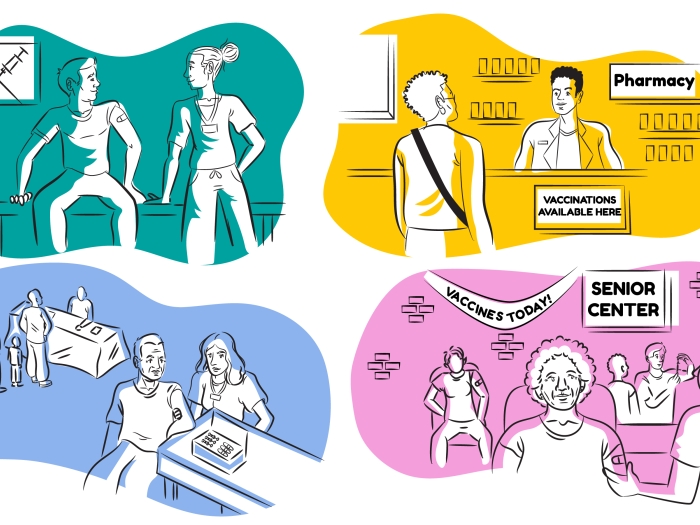Authors |

When dealing with a global pandemic of proportions not seen in 100 years, a shift from the status quo must occur. From an ethics perspective, this requires framing issues from a public health perspective — looking at overall risks and benefits to communities — rather than the patient-centered, autonomy-focused approach generally practiced in clinical medicine.
In mid-March, everything changed for both the research and clinical sides of Michigan Medicine. Many researchers redirected their energies into COVID-19 projects, addressing everything from diagnostics and therapeutics to the sociological effects of stay-home orders on families, and so much more. Clinicians limited nonessential in-person interventions, rapidly scaled up capacity for virtual patient care visits, freed up hospital space to convert into intensive care units, and offered clinical updates and free online information and training to the community at large.
As front-line clinical staff and researchers took on these challenges, bioethicists from the Center for Bioethics and Social Sciences in Medicine (CBSSM) joined the response. Established in July 2010 and currently directed by Reshma Jagsi, M.D., D.Phil., CBSSM includes faculty who serve the university as ethics consultants for clinical and research matters. We've refocused many of our efforts to supporting our colleagues as they think through the many complex decisions that must be made during a recalibration of this scale.
The drastic shift from a clinical (patient-focused) ethic to a public (community-focused) ethic can cause understandable and significant challenges and distress among patients, family members, and the clinical team — but this shift is a necessary result of the pandemic.
One area in which this tension is most apparent is the allocation of scarce resources, including rooms in the hospital, trained staff and clinicians, medical devices such as ventilators, disposable respirator masks worn by clinicians, and much more.
Ethicists generally caution clinicians not to "ration at the bedside," as in-the-moment decisions in the context of a clinician/patient relationship are inexorably biased. Instead, ethicists generally recommend that institutions articulate transparent, consistent, and fair criteria for allocation that consider which patients will benefit most from the scarce resource. Michigan Medicine has been planning for this possibility for over a decade, since the onset of the H1N1 influenza pandemic in 2009, and thus we were well prepared to update and refine our guidelines for the current crisis.
In addition, continued hospital admission, treatment, and discharge planning have become more complicated as the balance of risks and benefits changed in light of COVID-19. For example, asking a patient to present for a routine intervention, such as a non-urgent visit with their obstetrician or annual bloodwork to check their cholesterol, might no longer yield a net benefit to that individual in the context of the elevated infection risk they would face from leaving home — even without considering consequences for others. In another example, prior to COVID, discharge from the hospital to a skilled-care facility might have been viewed as the safer, less risky, and medically recommended option for some patients. During the pandemic, which has struck communal living facilities especially hard, this is no longer the case. Also, discharging patients without stable housing or the ability to self-isolate at home may pose a harm to their communities.
As front-line staff and clinicians become more physically and emotionally exhausted during the pandemic, it becomes increasingly difficult to focus on and process novel features of individual cases. We are continually challenged to help clinicians work within an ethically sound triage process, making space for reflection and creative thinking, and attending to the emotional well-being of the individuals involved.
Last, in the area of research, important questions include: Will individual protocol proposals do more good than harm for individual patients and generate information that we can use to improve care for others? Are we acting as responsible stewards of scarce research resources, including materials, human resources, committee review time, and research participants? How do we ensure an equitable allocation of both the risks and benefits of research across society and communities? Michigan Medicine has created a robust framework through which to assess and prioritize COVID-19-related research as well as clinical trials.
We continue to be inspired by the energy, strength, compassion, and passion of our clinical, research, and front-line colleagues, including environmental, food, and other essential service providers. We have faced many complex, and sometimes devastating, decisions together since the onset of the pandemic. But we have been able to come together across specialization and disciplines in solidarity toward the overarching goal of providing the best care possible for our patients and the state of Michigan.





